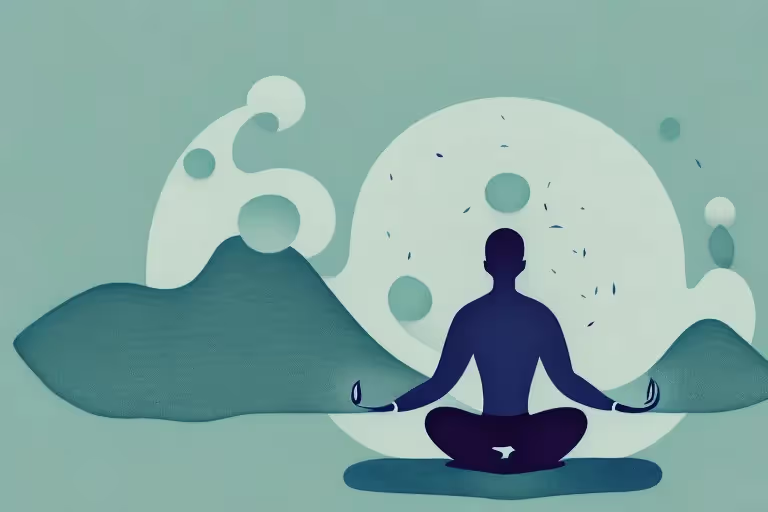Vipassana Meditation has gained increasing popularity in recent years as more people seek inner peace and mindfulness in their lives. This ancient practice, originating in India over 2,500 years ago, offers a range of benefits for both the mind and body. By understanding the origins, principles, and practice of Vipassana Meditation, individuals can unlock its potential and experience its many advantages.
Understanding Vipassana Meditation
Vipassana Meditation, also known as insight meditation, is rooted in Buddhist traditions. It involves developing self-awareness by observing the sensations of the body and mind. By practicing non-reactive observation, practitioners gain insight into the impermanence and interconnectedness of all experiences.
The Origins of Vipassana Meditation
Vipassana Meditation was rediscovered by Gautama Buddha in the 6th century BCE. After attaining enlightenment, he taught this technique as a means to liberate oneself from suffering. The practice was passed down through generations, benefiting millions of individuals seeking spiritual growth and self-realization.
The origins of Vipassana Meditation can be traced back to ancient India, where it was practiced by ascetics and yogis seeking spiritual enlightenment. These early practitioners believed that by observing the sensations of the body and mind, one could gain insight into the nature of reality and achieve liberation from suffering.
Over time, Vipassana Meditation became an integral part of Buddhist teachings and was practiced by monks and laypeople alike. It spread throughout Asia and eventually reached the Western world, where it gained popularity as a form of mindfulness meditation.
The Principles of Vipassana Meditation
The practice of Vipassana Meditation rests on three core principles: sila (ethical conduct), samadhi (concentration), and panna (wisdom). Practitioners follow a strict code of conduct, develop concentration through mindfulness of breathing, and cultivate wisdom through self-observation. These principles form a solid foundation for personal transformation.
The principle of sila emphasizes the importance of ethical conduct in one's daily life. Practitioners are encouraged to cultivate virtues such as honesty, compassion, and non-harming. By living in accordance with these principles, individuals create a conducive environment for the practice of meditation and the development of wisdom.
Samadhi, the second principle, refers to the cultivation of concentration and focused attention. Through mindfulness of breathing or other objects of meditation, practitioners train their minds to become calm, steady, and fully present in the present moment. This state of concentration allows for deeper insights and a clearer understanding of the nature of reality.
Panna, the third principle, is the development of wisdom through self-observation. By observing the sensations of the body and mind without judgment or attachment, practitioners gain insight into the impermanence, unsatisfactoriness, and selflessness of all phenomena. This wisdom leads to a profound understanding of the interconnectedness of all experiences and the nature of suffering.
Through the practice of Vipassana Meditation, individuals can transform their lives by developing self-awareness, cultivating ethical conduct, and gaining wisdom. It is a powerful tool for personal growth, spiritual development, and the attainment of inner peace.
The Practice of Vipassana Meditation
To embark on the journey of Vipassana Meditation, it is essential to prepare both the mind and body. Creating a calm and conducive environment, practitioners ensure optimal conditions for self-discovery and transformation.
Vipassana Meditation is a profound practice that dates back thousands of years. Originating in ancient India, it was rediscovered by Gautama Buddha and has since been passed down through generations. The word "Vipassana" means "insight" or "clear seeing," emphasizing the practice's goal of developing deep insight into the nature of reality.
Before diving into Vipassana Meditation, it is advisable to establish a daily routine of meditation. This builds discipline and familiarity with the practice. Additionally, finding a quiet place free from distractions helps create a peaceful environment conducive to inner exploration.
Practitioners often set aside a specific time each day for their meditation practice. This dedicated time allows them to fully immerse themselves in the process without any external disturbances. Some choose to meditate in the early morning, taking advantage of the stillness and tranquility that dawn brings.
When preparing for Vipassana Meditation, it can be helpful to create a designated meditation space. This can be a corner of a room, a cushion or mat, or even a small altar adorned with meaningful objects. By designating a specific area for meditation, practitioners signal to their mind and body that it is time for focused introspection.
Steps in Vipassana Meditation
The practice of Vipassana Meditation involves several steps. First, practitioners focus their attention on the sensations of their breath or a chosen anchor point. This initial step helps calm the mind and bring it into the present moment. By observing the breath, individuals cultivate a sense of mindfulness and develop the ability to anchor their attention.
As the practice progresses, practitioners expand their awareness to bodily sensations. They observe these sensations without judgment or attachment, simply acknowledging their presence. This step allows individuals to develop a deeper understanding of the mind-body connection and the impermanent nature of sensations.
During Vipassana Meditation, practitioners may encounter various physical and emotional sensations. Some sensations may be pleasant, while others may be uncomfortable or even painful. The key is to observe these sensations with equanimity, neither grasping onto the pleasant nor resisting the unpleasant. This practice cultivates a sense of acceptance and non-reactivity, allowing individuals to develop a balanced and compassionate approach to their experiences.
Gradually, as individuals continue their Vipassana practice, they begin to uncover profound insights about the nature of reality and the workings of their own mind. This deep understanding can lead to transformative changes in one's perception, behavior, and overall sense of well-being.
In conclusion, Vipassana Meditation is a practice that requires dedication, patience, and an open mind. By preparing the mind and body, establishing a daily routine, and following the steps of the practice, individuals can embark on a journey of self-discovery and inner transformation.
The Psychological Benefits of Vipassana Meditation
Beyond its spiritual significance, Vipassana Meditation also offers substantial psychological benefits. These benefits stem from the development of mindfulness and concentration, which contribute to enhanced mental well-being.
Enhancing Mindfulness and Concentration
Vipassana Meditation strengthens mindfulness, enabling individuals to become fully present in each moment. By observing thoughts, emotions, and bodily sensations without judgment, practitioners cultivate self-awareness and develop greater control over their reactions. As a result, mindfulness and concentration improve, leading to increased focus and clarity in daily life.
Reducing Stress and Anxiety
Stress and anxiety are prevalent in today's fast-paced world. Vipassana Meditation offers a natural remedy for these struggles. By observing the sensations associated with stress and anxiety, individuals gain insights into the impermanent nature of these experiences. They learn to let go, bringing about a profound sense of relief and calmness.
The Physical Benefits of Vipassana Meditation
Vipassana Meditation not only nourishes the mind but also reaps physical benefits that contribute to overall well-being. These benefits range from improved heart health to a strengthened immune system.
Improving Heart Health
Research suggests that Vipassana Meditation can lower blood pressure and reduce the risk of heart disease. By cultivating awareness of the mind-body connection, individuals can manage emotions effectively, leading to reduced stress levels and improved cardiovascular health.
Boosting Immune System
Vipassana Meditation has been linked to a strengthened immune system. By reducing stress and anxiety, individuals experience fewer negative physiological effects associated with chronic stress. This, in turn, enhances the body's natural defense mechanisms, promoting better overall health.
Personal Experiences with Vipassana Meditation
The transformative power of Vipassana Meditation is not just a mere theory; it is attested by numerous personal stories and case studies. These accounts serve as an inspiration for those seeking to embark on their own journey of self-discovery.
Case Studies and Testimonials
Many individuals who have practiced Vipassana Meditation report profound changes in their lives. They speak of reduced stress levels, improved relationships, and enhanced overall well-being. These personal stories highlight the transformative potential of this ancient practice.
How to Incorporate Vipassana Meditation into Your Daily Routine
Integrating Vipassana Meditation into daily life can be highly beneficial. However, like any practice, it requires dedication and consistency to unlock its full potential. Here are some useful tips and strategies for beginners.
Tips for Beginners
Beginners often face challenges when starting Vipassana Meditation. It is crucial to be patient and approach the practice with an open mind. Consistency is key, so starting with shorter sessions and gradually increasing duration helps establish a regular meditation routine.
Overcoming Common Challenges in Vipassana Meditation
Throughout the journey of Vipassana Meditation, practitioners encounter various challenges. These challenges can range from physical discomfort to difficulty focusing. By acknowledging and accepting these challenges, individuals can develop resilience and continue to deepen their practice.
Discover the Benefits of Vipassana Meditation with Aura Health App
Start your journey towards inner peace and self-discovery with the Aura Health App. This innovative app offers guided meditations, personalized programs, and progress tracking features to help individuals incorporate Vipassana Meditation into their daily lives. Unlock the benefits of Vipassana Meditation with Aura Health and experience the transformative power of mindfulness.
Aura is Your All In One App for Meditation, Mindfulness Wellbeing
Find peace every day with one app for your whole well-being. There is no one-size-fits-all solution to mental well-being. Aura is the first all-in-one wellness app that learns how to best help you. Discover an endless library of expert-created tracks for your well-being, all taught by the world’s best coaches, therapists, and storytellers. With Aura's personalized recommendations, you can find peace every morning, day and night.



.webp)






.avif)

%20(1).avif)


.avif)
.avif)
.webp)


.avif)


















































































































.avif)

















.svg)









